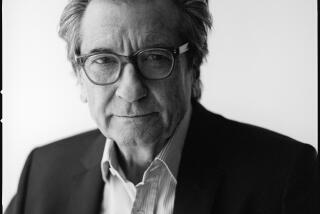CRITIC AT LARGE : IRENE DUNNE: ALWAYS A LADY OF THE HOUSE
- Share via
“You don’t have to do anything,” Irene Dunne was saying. “You just sit and watch. It’s quite wonderful. And they don’t give you a clue as to what they’re going to do. But they’ve been after me for weeks for baby pictures, pictures when I was 4, pictures of my mother, and of course they’re getting clips from my movies.”
Irene Dunne: She is one of the six winners of the eighth annual Kennedy Center Honors, to be presented at the end of the week in Washington, in ceremonies to be televised later. She is thrilled by the company.
“There I’ll be with my favorite comedian (Bob Hope), my favorite opera singer (Beverly Sills) and the two fellows who wrote my favorite show of all (Frederick Loewe and Alan Jay Lerner of “My Fair Lady”). She has not seen the work of the sixth honoree, choreographer Merce Cunningham, but is thrilled no less.
The assemblage of film clips ought to evoke more than a few memories, counting only the five films for which she received Academy Award nominations: “Cimarron” in 1931, her first film to be released, “Theodora Goes Wild” (1936), “The Awful Truth” (1937), “Love Affair” (1939), which she thinks may be her favorite, and “I Remember Mama” from 1948.
But there are the others as well, including the large melodramas like “Back Street” and “Magnificent Obsession,” for which she has a particular affection and which she thought were her forte, not comedy.
“Comedy was easy for me, but it wasn’t rewarding in the same way,” she says. “But Cary (Grant, her co-star in “The Awful Truth” and “Penny Serenade”) paid me one of the loveliest compliments of my life. He said I had the best timing of anyone he’d ever worked with. It must be something that comes to you naturally. My father had a keen sense of humor, which I think is different from just having a sense of humor. Perhaps I inherited some humor from him.”
Having done dramas and musicals (her singing of “Yesterday” and “Smoke Gets in Your Eyes” in “Roberta” in 1935 was something to cherish), she fought the whole idea of doing “Theodora Goes Wild,” a madcap comedy about a small-town woman who writes a scandalous best seller.
“My husband and I took a trip to Europe, hoping to get out of doing it. But when we got back, there it was, waiting for us.” So she did it, with Melvyn Douglas as her co-star, and acquired a new reputation as one of the most expert romantic comediennes in the movies, in a time when there was a richness of charming comediennes.
The Dunne mixture of astonishing beauty, intelligence, innocent allure, a silvery voice with an uncommonly entrancing laugh, and the timing admired by Cary Grant, made her seem then, and now in retrospect, the epitome of Hollywood’s late ‘30s film making at its best.
Brought to Hollywood by RKO, she was (with next-door neighbor Claudette Colbert) one of the earliest free-lance, or at least non-exclusive stars, free to do films at Columbia and other studios. Significantly, she never sought approval on co-stars or writers, but demanded the power to OK her directors, of whom George Stevens and Leo McCarey were particular favorites.
She had set out to be a singer, graduating from Chicago Musical College with dreams of grand opera. An audition at the Met in New York persuaded her, she says, “that I didn’t have the equipment for grand opera. Light opera looked like the better way for me.”
She arranged an audition with Oscar Hammerstein II. “It led to a story he loved to tell later. Not true, of course. Well, true but quite exaggerated. He said he couldn’t use me, and I said, ‘What do you mean ?’ and burst into tears. He patted me on the shoulder and saw me to the elevator and then--this is what I think is quite untrue--said he watched me from the window, walking sadly up the street, dragging my little sweater behind me.”
The irony was, of course, that the Jerome Kern-Oscar Hammerstein “Showboat” was to become a major stage success for her, and eventually a co-starring film role with Allan Jones, Helen Morgan and Paul Robeson. She and Hammerstein became good friends, and so did Richard Rodgers.
The other famous Irene Dunne elevator story is that she was sharing one with Florenz Ziegfeld, en route to an appointment. Ziegfeld presumed she was on the way to see him (she wasn’t). When she didn’t appear, Ziegfeld sent his secretary hurrying to find her, having been impressed by her beauty. He put her in a road company of “Showboat” and on the high road to fame.
She was born in Louisville, Ky., but of Hoosier stock, and she spent her youth from age 4 in Madison, Ind. “The night in New York I met my future husband, I was dancing with another fellow and he said, ‘Where are you from?’ I said, ‘Madison, Indiana.’ Then I danced with this new fellow and he asked the same thing. He seemed a more cosmopolitan type, somehow, so I said I was from Louisville. The two men compared notes later and one of them said, ‘That girl doesn’t even know where she’s from.’ But my husband to be evidently found it intriguing.”
He was Francis Griffin, a dentist-businessman. They built the gracious home she still lives in in Holmby Hills in 1936. When he died of a sudden heart attack in 1965, she found herself having to take over their business interests, which included a part ownership of the Beverly-Wilshire Hotel.
“All the time we were married, I never looked at a financial page, and that’s always a mistake for a woman.” She moved their office from Century City into their house and has a secretary who comes in daily. “I can go in and work in my robe, if I want to,” she says.
She is active in a few charities, notably St. John’s Hospital, where a bust of her by Artis Lane was installed in a garden last May. But after some back problems a few years ago she attends few public events--”those awful things with tons of people where you stand and wait an hour for your car.”
But she does sneak off occasionally to 3 o’clock movie matinees in Westwood, and she watches a good many other films on cable. “I can wait,” she says.
She is not impressed with many of the films she sees, nor with some among a new generation of actors and actresses who may be talented but who do not, in her eyes, make a sufficient contribution to the community.
Her own image, madcap comedy and all, was of a woman of great dignity, a lady in a gypsy encampment. “I was in Hollywood but not of it, I suppose,” she says. “They used to call me a lady and I resented that title for years. Then I thought, ‘Well, there are worse things you can be called,’ so I gave up the fight. People who know me say I’m much more like Theodora.
“One young fellow asked me about the lady business, and I said, ‘I can fool people.’ He got very excited and said, ‘Tell me! Tell me!’ I said, ‘Oh, dear boy, I’m joking. I’m fooling you!’ ”
A granddaughter, Ann Shinnick, will accompany her to Washington. “She’ll zip me up, if anything urgent like that is required.”
Depending on which film source you read, Irene Dunne will be 81, 84 or 87 on Dec. 20. The official birth year is 1904, which makes her almost 81 and which she says sternly is correct, although in all events, “We do not think about Dec. 20. It is a day I choose to disregard.”
The lady has become the grande dame, a commanding presence but with a touch of mischief and amusement absolutely in place.
More to Read
Only good movies
Get the Indie Focus newsletter, Mark Olsen's weekly guide to the world of cinema.
You may occasionally receive promotional content from the Los Angeles Times.








